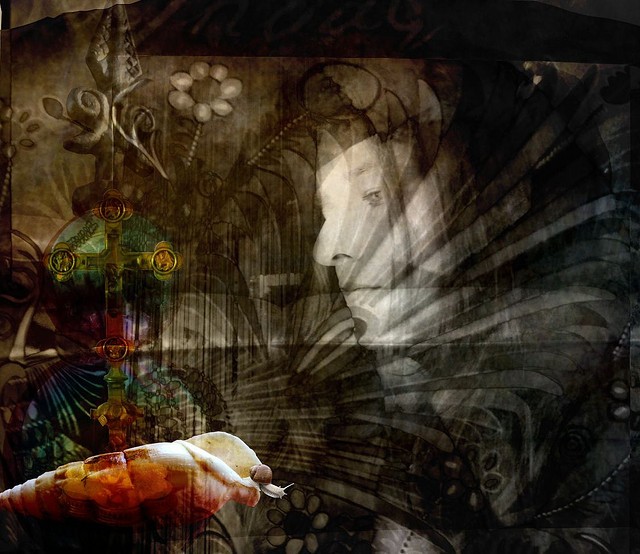
Warning: adult language below!
Many of us have some degree of emotional or psychological baggage.
This seems to be an existential fact.
We are raised in a world that conditions us primarily to carry around a lot of self-hatred, psyho-phobia and division. We are taught to view things in a very malignant, human-centric, mechanistic and hierarchal way.
Many of us feel a sense of conflict and disharmony with these feelings: “this sucks, so there must be a higher more spiritual realm or a place where things could be better.”
I am suggesting that this belief is actually just the same old belief system under another guise and that the vast majority of the time, the vast majority of the people carry over the same hierarchical mechanical worldview over into the “spiritual world.”
Yet instead of accepting and acknowledging these basic facts, most of the time people create more complication and bullshit for themselves by trying to “spiritualize” or “spiritually bypass” their problems. This is like rearranging the furniture on the Titanic thinking it’s going to make a real difference.
I heard a quote once that the person quickest to deny that methods of mind control and hypnosis exist is the person most likely be under their influence.
The illusion of “self help”
If we are labeling ourselves as broken, then how can we fix our broken selves?
If we don’t trust ourselves, then how can we trust (or mistrust) ourselves?
Freedom
Freedom doesn’t necessarily lie in replacing one dictator with another.
We would be remiss to ignore the fact that if we have been stuck in one extreme, then the most likely place we will end up next is the other end of that extreme. Suppression and permissiveness tend to arise together and interact in sometimes strangely profound ways. This is a natural process, and often implicit with the healing journey.
We see this a lot with people who binge and purge in a myriad of ways—spend five minutes in any diet, health, or spiritual community and you will likely spot this pattern.
Being a slave to one idea and then replacing it with another idea to be a slave to doesn’t represent a real transformation. This is kind of like when people are attached to attachment and they decide that it’s better to be attached to non-attachment—ha!
What about just not being a slave to any idea? What about getting off the hamster wheel entirely?
What I am really suggesting here is the difference between change and transformation. Many use them interchangeably and fail to realize the major difference between them.
Change would basically just be going from one extreme to the other, but still really staying within the same paradox. Whereas transformation, by definition, implies going above or beyond the current form.
Change is something that is often contingent upon a great deal of will power and effort, whereas transformation tends to happen on its own accord when the timing is right. The former tends to stroke and support our ego, while the latter tends to suggest that we set aside our fixed way of doing things and our illusion of control.
Herein lies part of the paradox because if we have an established way of doings things and a belief system which we have decided is not working for us, then isn’t it obvious that something there would need to be modified or eliminated?
“You can’t solve a problem at the level of consciousness that created it.” ~ Einstein
Transformation tends to show up as an AH HA moment, a flash of insight, or some kind of shock that leads to a qualitative shift in our awareness or mode of perception. (Notice I said qualitative and not quantitative.)
We’ve all had the experience of just being done with something and not giving it really a second thought. Yet we’ve also had the hellish experience of fighting and battling ourselves with incessant back and forth and whole slew of “I shoulds and I musts.”
This is the major distinction we are looking at.
Some examples
We can see this in the common belief: “Well I used to be this, but now Im going to be X,Y, and Z because it’s spiritual or conscious.” “I was lost, but now I’m found.”
This largely reinforces division through the mindset of: this part of me is good, this part of me is bad and I have to get rid of the bad parts through some discipline, method, or cult.
Really what a lot of this comes back to is deeply embedded unconscious self hatred, which creates the belief that this place sucks, i.e. the present moment here and now, but this other place that I am imagining is or will be better.
The whole idea of wishing, willing, or imaging a spiritual place somewhere else higher or better than the present moment is actually a big middle finger to reality and to your innermost self.
These spells tend to lead to a lot of passive aggressiveness, suppression and repression. Or the modern phenomena of what we might call “The smiling depressive.”
Suppression is when you do it to someone else, repression is when you do it to yourself.
A prime example:
Putting down the physical body and demonizing various aspects of it is an egregious form of self hatred. that few are even aware of. Likewise, grossly exaggerating and worshipping the body, i.e. much of mainstream culture, is also a manifestation of the same self hatred.
What we should’ve been taught in school is that the body is fucking magic, the world is magic. Just because we can give a name to something or roughly approximate a portion of its functioning doesn’t that mean that we necessarily understand it or that it is any less magical.
All of these things, existence, reality, the ground of being, the river of time, whatever you want to call it, are happening all around us and inside of us all the time and we don’t really have to do anything. We have the ability and capacity to just sit back and watch it, as it’s really a matter of choice, a way of seeing, and a mode of perception.
Most of the time we choose not to, we choose to denigrate our self and our very being.
Another way to say this is that if a person isn’t self centered, then it’s highly likely they’ll be bullshit-centered. By self, I do not mean the ego, but this is something we will explore in more detail in another article.
Things tend to get fucked up once we start getting in our own way. Think about it, our eyes see, our ears hear, we digest food, we adjust body temperature, we experience sexual arousal, etc. We do all of these things naturally and without effort and it’s only once something is wrong that we tend to notice it. Most of the time what’s wrong is that we are getting in the way of our natural functioning.
Maybe the dark is actually dark because we hate it and push it away.
It’s highly likely then that our bullshit downgrading of the physical body plays a big role in that dynamic. On that note, I have to point out that I am not saying we go the other extreme and elevate the physical, that again would just be more bullshit, as one extreme tends to create the other, and vice versa.
Even deeper
There are different kinds of emotion, some are more natural, some are more artificial.
I’m paraphrasing a bit here, Freud said that the goal of psychotherapy was to replace neurotic anxiety with genuine human suffering.
If we are divided, psycho-phobic, and riddled with self hatred, then how can we necessarily expect to live a natural and harmonious life?
If we are living an unnatural and disharmonious life, then how can we expect to feel genuine emotions, positive or negative?
So, then what Im saying here is that sometimes our negative emotions are good because they are pointing out to us that something is off, maybe we are living an inauthentic life, or perhaps complicit in a very dysfunctional and unsustainable way of living.
Do we merely have a lifestyle, or do we have an actual life?
What all of this has to do with the point of this article is that most of the time spiritualizing our problem is just another way of blaming, postponing awareness, and projecting our problems onto the external world. Obviously we are social creatures and need to relate with others, also it highly useful to have teachers and guides on our path. The downside is that much of the time both of these things take us further and further away from ourselves while making things seem as complicated and difficult as possible.
They create a new set of rules, regulations and hoops to jump through. Hence what I said earlier about replacing one dictator with another and what I meant by spiritualizing things making them worse.
Simply put: no one can occupy your center but you. No one can walk your path but you.
These are simple and verifiable existential facts.
So then, who has the power?
Could it be possible that it’s a bit simpler and easier than you’ve been told?
These are important questions to consider and reflect upon.
What do you think?
In conclusion
We all have done (and are still doing) this shit on a regular basis. I’m not writing this pretending that I’m above it or that I’ve found the Archimedean point from which the one real reality can be seen. I could write a great deal of articles on the dumb shit I’ve done and believed in my life—I find that it’s actually pretty hilarious.
Finally, we are each on our own path which has its own time and intelligence and I believe we must respect that.
What I’ve written here may make no sense to you—and that’s totally okay.
Relephant:
5 Potentially Hazardous New Age Myths.
Author: Brandon Gilbert
Editor: Renée Picard
Photo: Eddi van W. at Flickr


Read 3 comments and reply